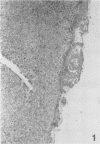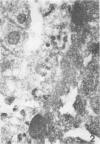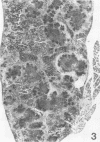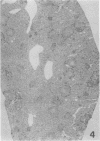Abstract
The pathogenic role of Yersinia enterocolitica serotypes O:3, O:8, and O:9 in human infections is well documented. Whereas the virulence of the O:8 strains can be readily demonstrated in mice by 50% lethal dose determinations, the O:3 and O:9 strains have no lethal effect on mice by any route of inoculation. A mouse virulence test for the O:3 and O:9 strains is described. Y. enterocolitica strains were first tested for the presence of virulence-associated plasmid characteristics by auto-agglutination and gel electrophoresis procedures before mouse virulence determinations. The 50% lethal dose of the O:3 strains injected intraperitoneally with 2.5% mucin was about 10(7) colony-forming units. However, histological examinations showed that mucin allowed the growth of Y enterocolitica on the surface of the livers and spleens of the mice without internal lesions. The 50% lethal dose of the same O:3 strains injected intraperitoneally with 1 ml of 10% iron dextran in saline was about 10(5) to 10(6) colony-forming units, and the nonlethal infective dose with typical lesion development was 20 to 200 colony-forming units. The infected mice developed symptoms and extensive liver and spleen lesions which differed from those in mice infected intraperitoneally with the virulent O:8 strains. These results showed that the virulence of the O:3 Y. enterocolitica strains can be measured by intraperitoneal injection with iron dextran. This procedure was used to test the virulence of food isolates, plasmidless strains, and the effect of growth temperatures.
Full text
PDF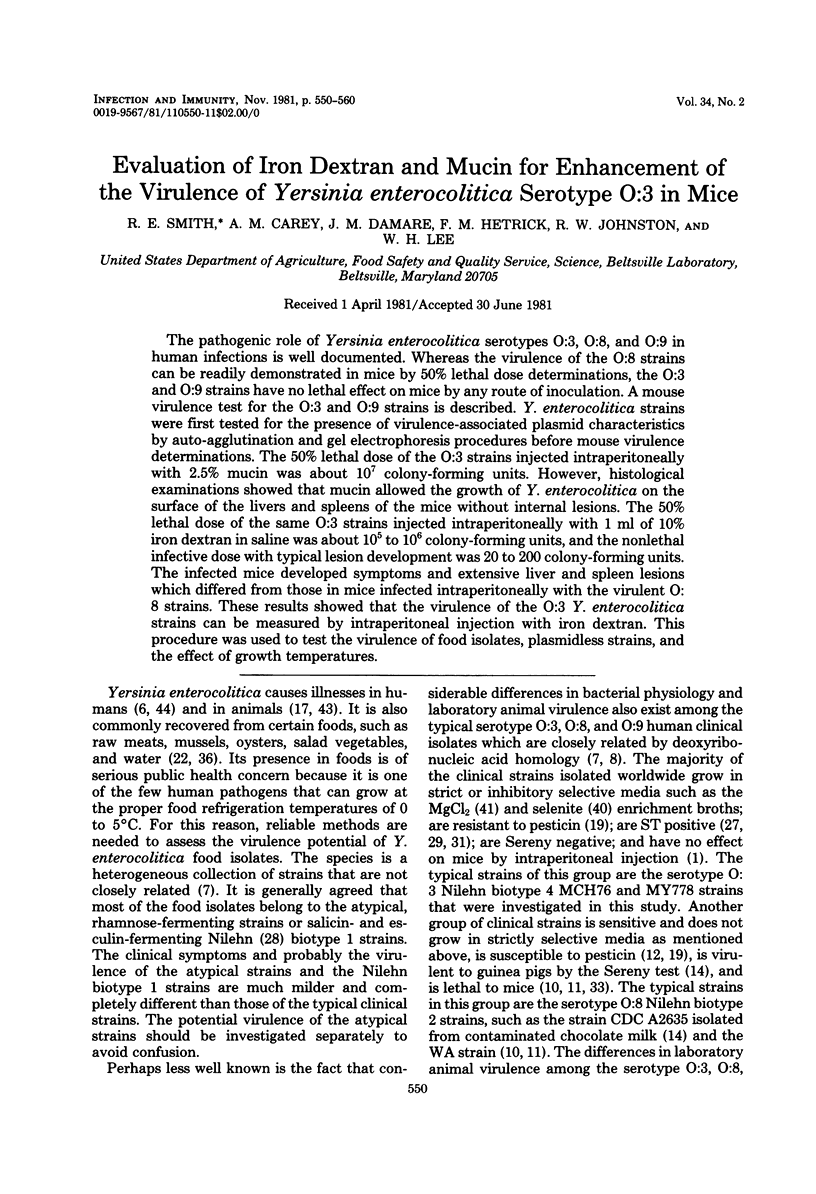
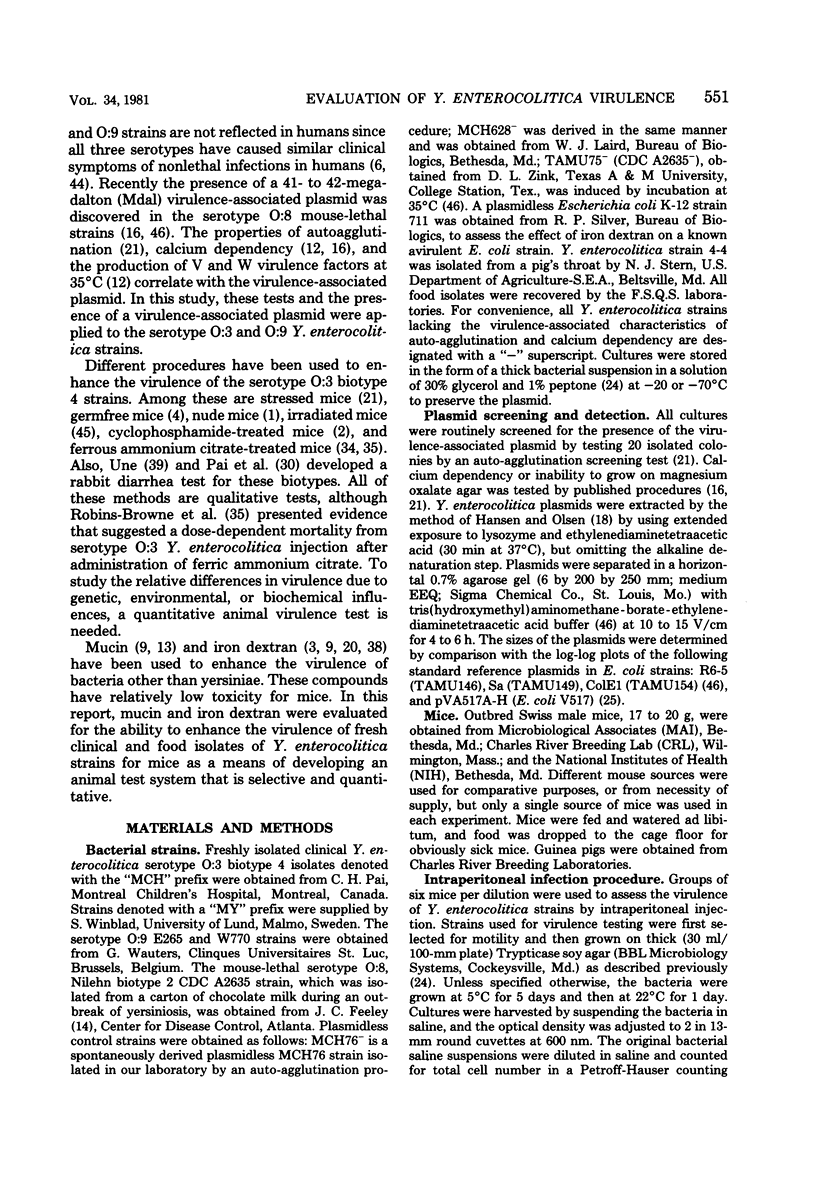
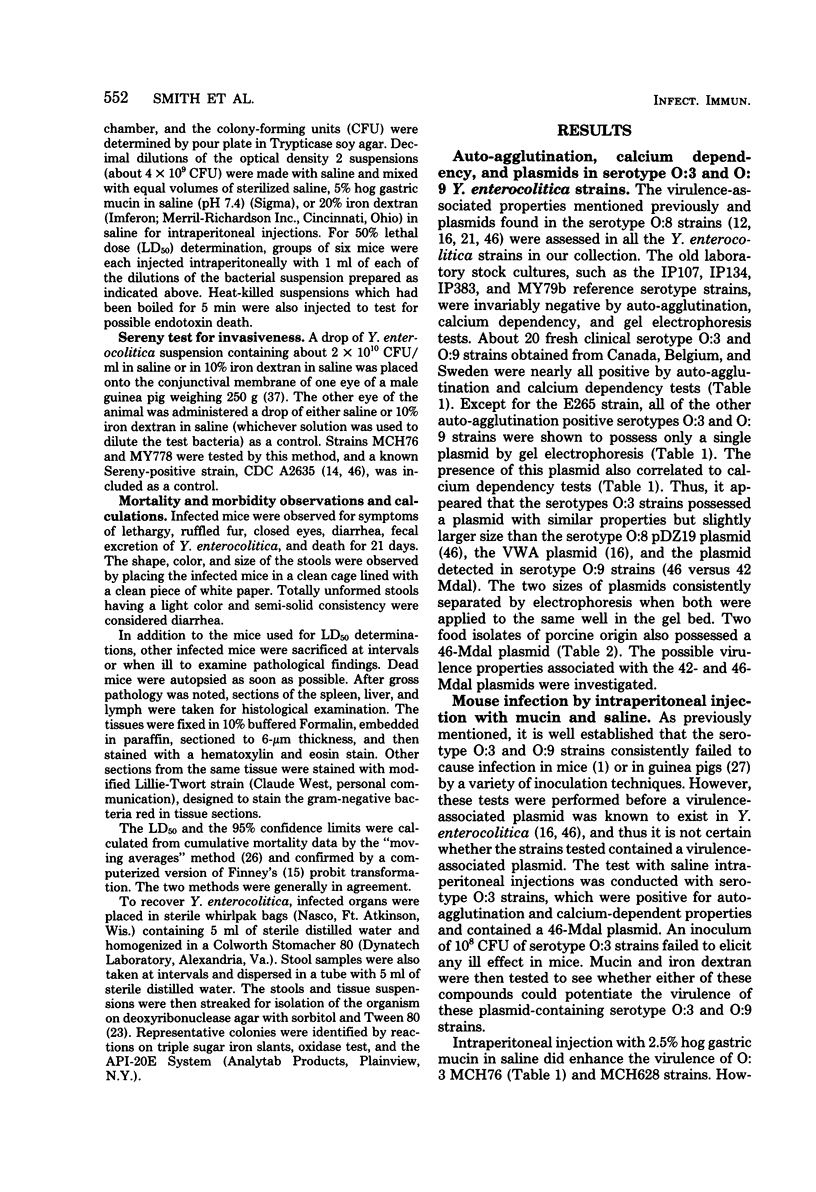
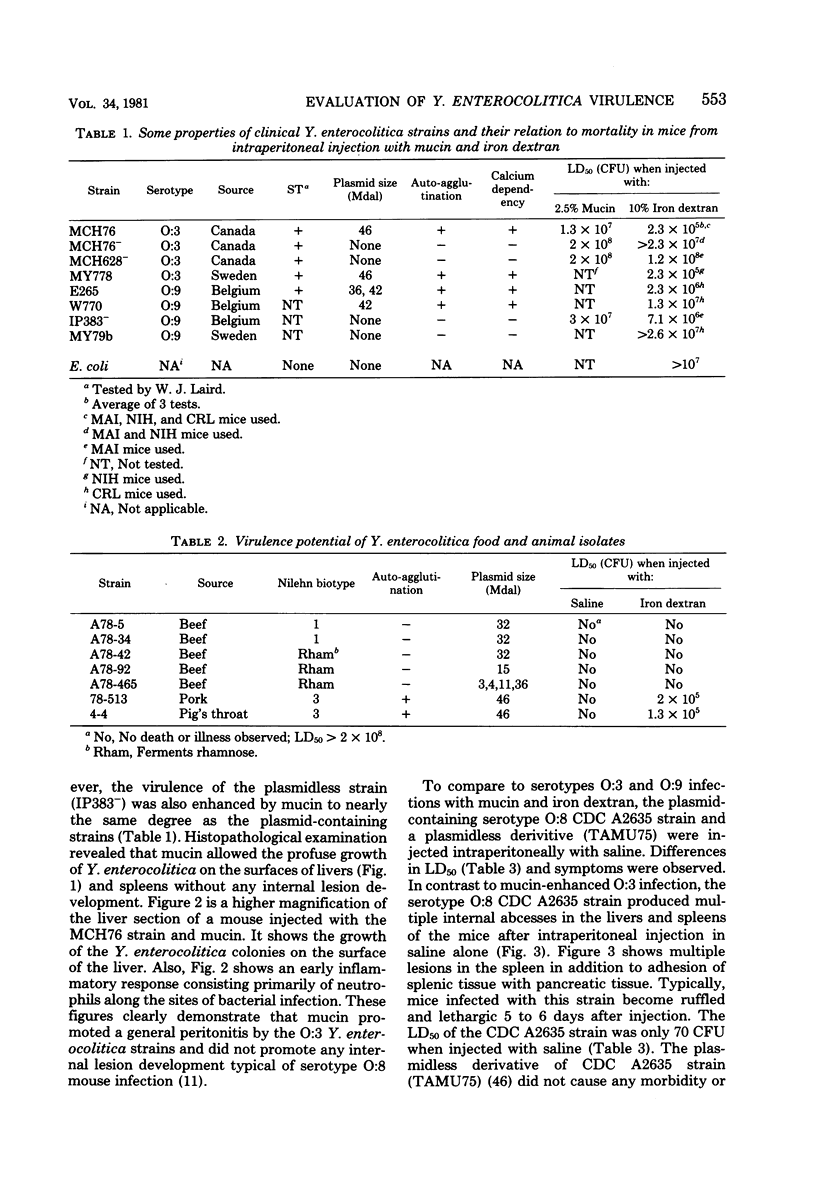
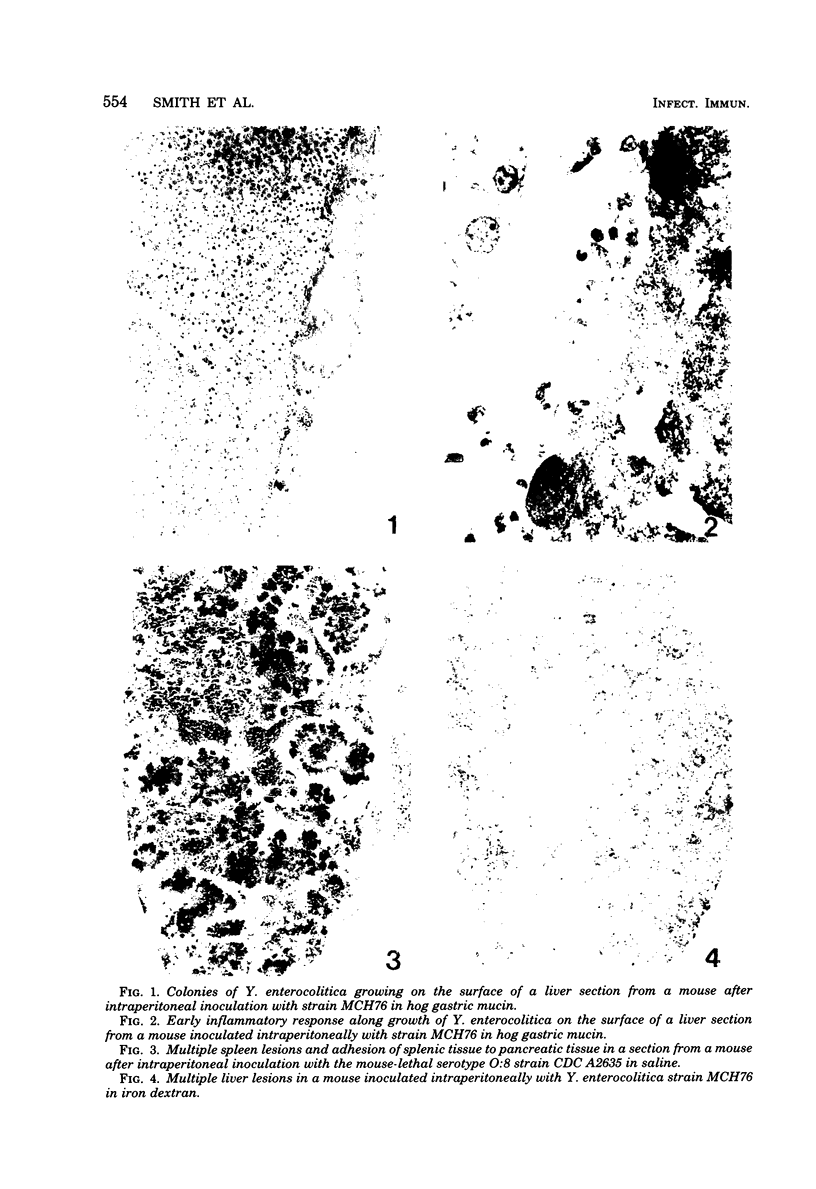
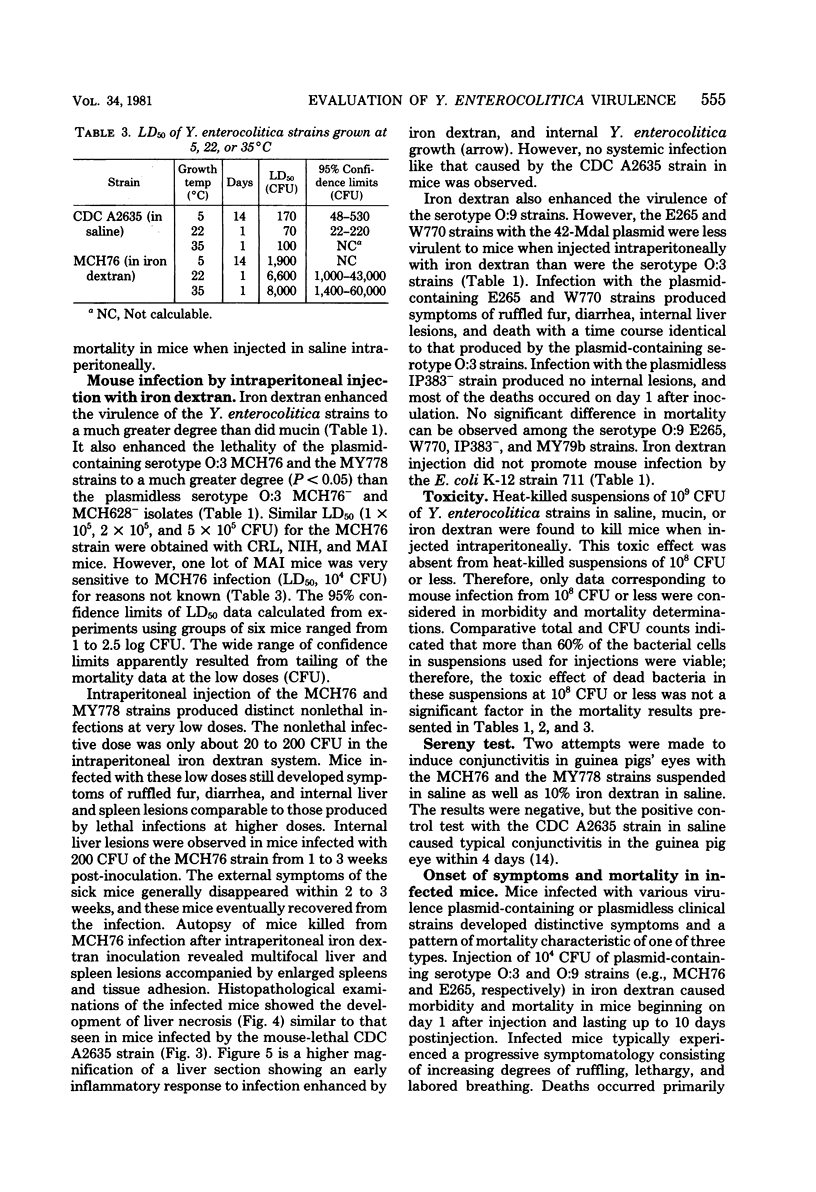
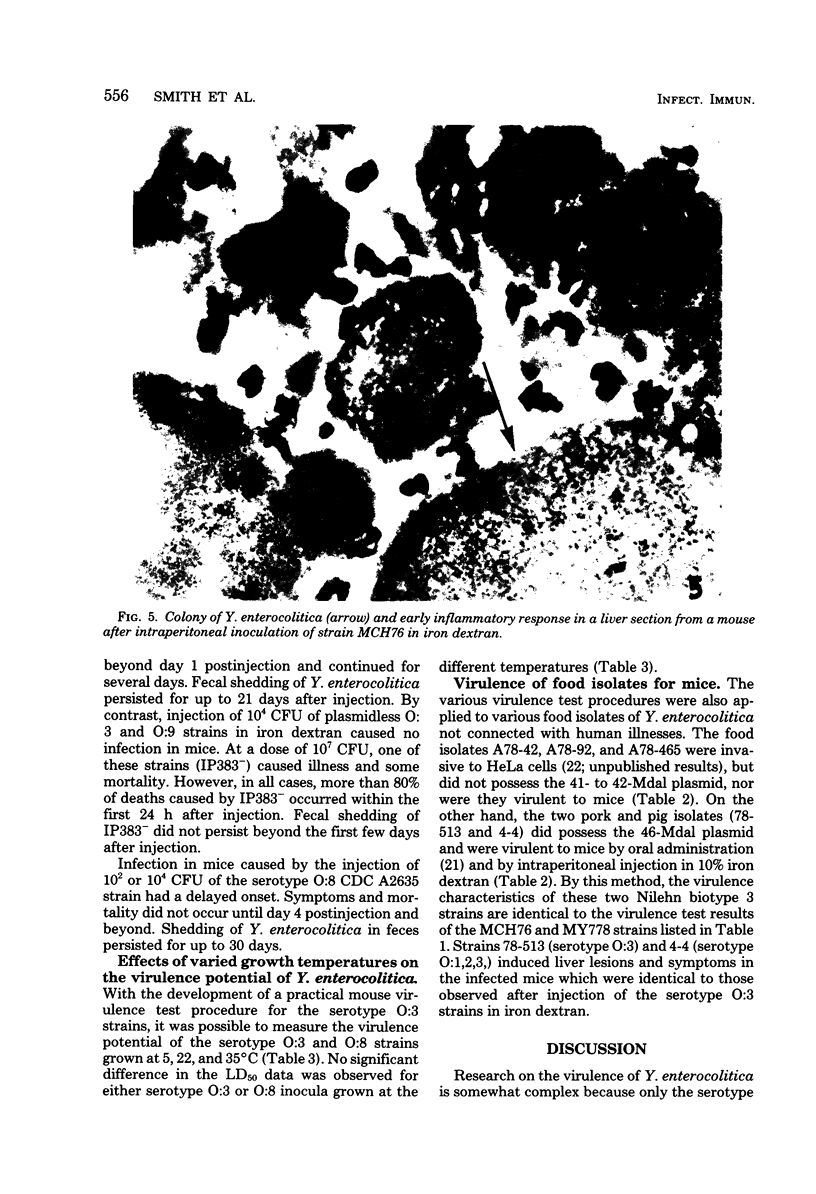
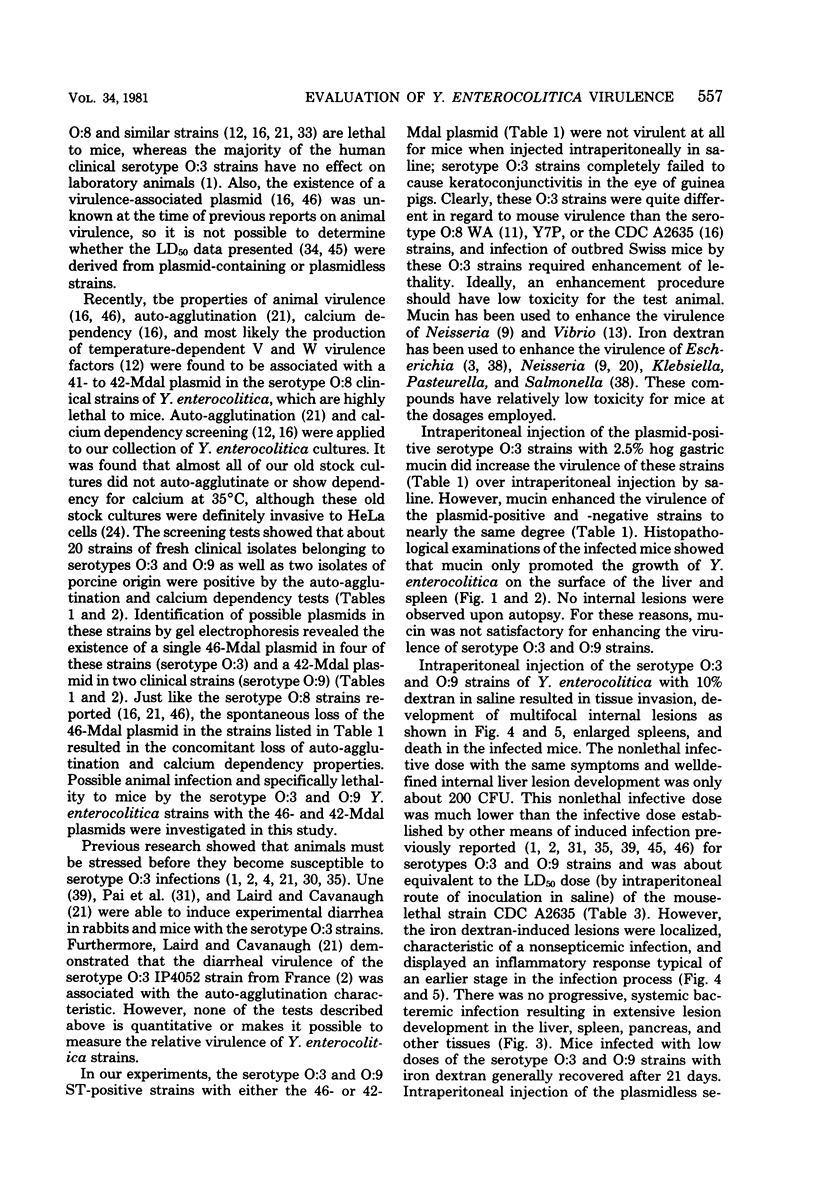
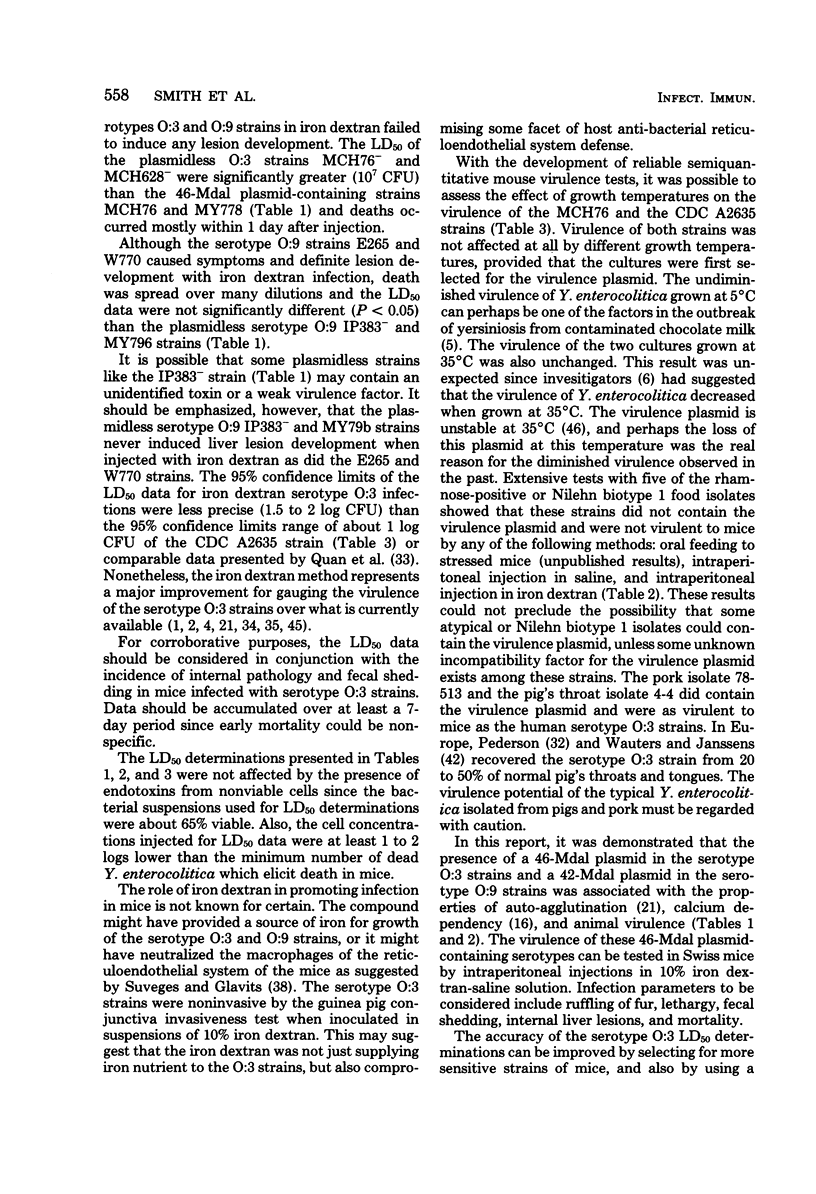
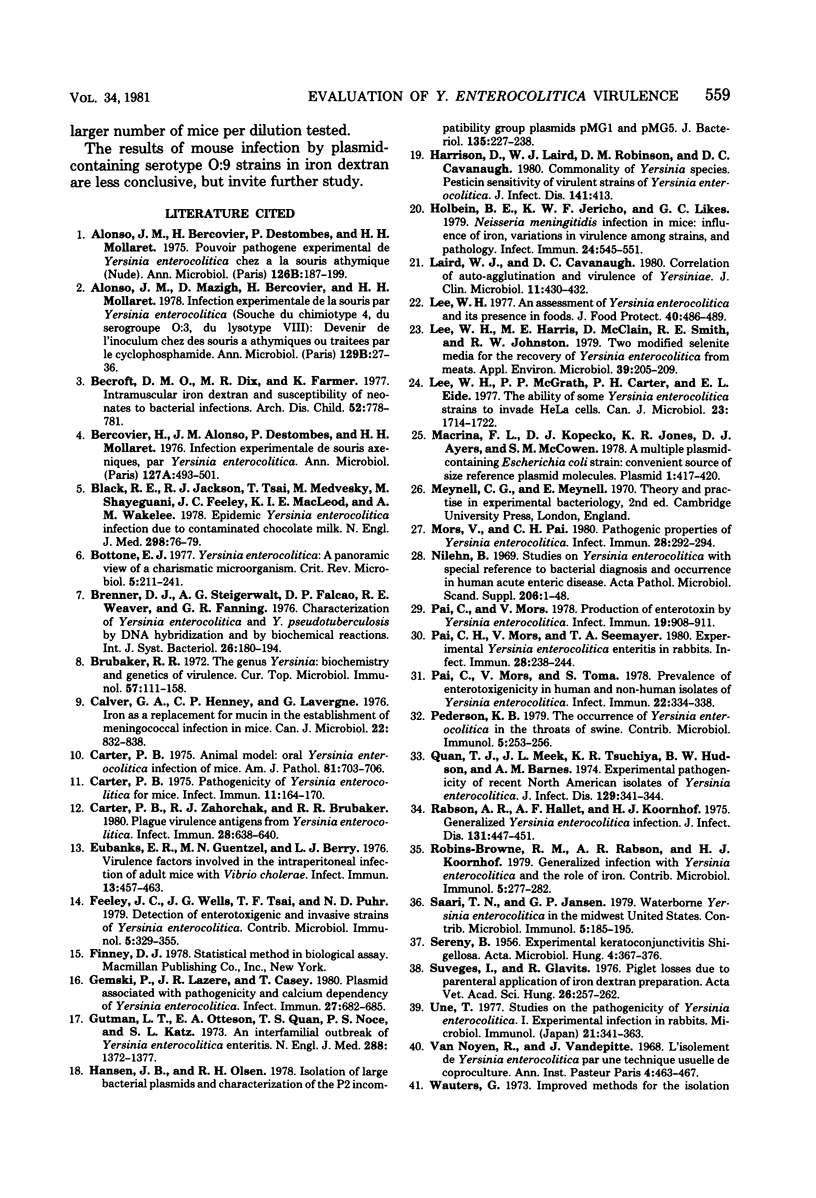
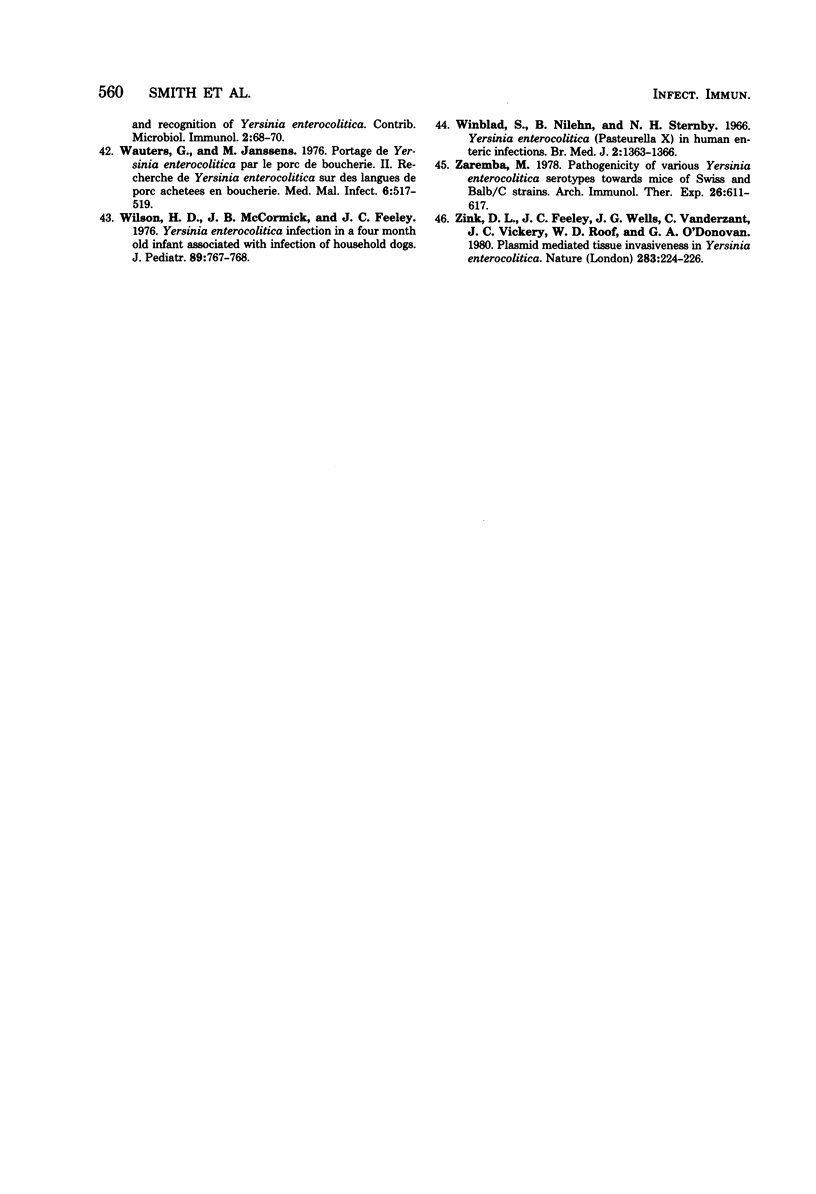
Images in this article
Selected References
These references are in PubMed. This may not be the complete list of references from this article.
- Alonso J. M., Bercovier H., Destombes P., Mollaret H. H. Pouvoir pathogène expérimental de Yersinia enterocolitica chez la souris athymique (nude) Ann Microbiol (Paris) 1975 Sep;126(2):187–199. [PubMed] [Google Scholar]
- Alonso J. M., Mazigh D., Bercovier H., Mollaret H. H. Infection expérimentale de la souris par Yersinia enterocolitica (souche du chimiotype 4, du sérogroupe O:3, du lysotype VIII): devenir de l'inoculum chez des souris athymiques ou traitées par le cyclophosphamide. Ann Microbiol (Paris) 1978 Jul;129B(1):27–36. [PubMed] [Google Scholar]
- Becroft D. M., Dix M. R., Farmer K. Intramuscular iron-dextran and susceptibility of neonates to bacterial infections. In vitro studies. Arch Dis Child. 1977 Oct;52(10):778–781. doi: 10.1136/adc.52.10.778. [DOI] [PMC free article] [PubMed] [Google Scholar]
- Bercovier H., Alonso J. M., Destombes P., Mollaret H. H. Infection expérimentale de souris axéniques par Yersinia enterocolitica. Ann Microbiol (Paris) 1976 May-Jun;127(4):493–501. [PubMed] [Google Scholar]
- Black R. E., Jackson R. J., Tsai T., Medvesky M., Shayegani M., Feeley J. C., MacLeod K. I., Wakelee A. M. Epidemic Yersinia enterocolitica infection due to contaminated chocolate milk. N Engl J Med. 1978 Jan 12;298(2):76–79. doi: 10.1056/NEJM197801122980204. [DOI] [PubMed] [Google Scholar]
- Bottone E. J. Yersinia enterocolitica: a panoramic view of a charismatic microorganism. CRC Crit Rev Microbiol. 1977;5(2):211–241. doi: 10.3109/10408417709102312. [DOI] [PubMed] [Google Scholar]
- Brubaker R. R. The genus Yersinia: biochemistry and genetics of virulence. Curr Top Microbiol Immunol. 1972;57:111–158. doi: 10.1007/978-3-642-65297-4_4. [DOI] [PubMed] [Google Scholar]
- Calver G. A., Kenny C. P., Lavergne G. Iron as a replacement for mucin in the establishment of meningococcal infection in mice. Can J Microbiol. 1976 Jun;22(6):832–838. doi: 10.1139/m76-120. [DOI] [PubMed] [Google Scholar]
- Carter P. B. Animal model of human disease. Yersinia enteritis. Animal model: oral Yersinia enterocolitica infection of mice. Am J Pathol. 1975 Dec;81(3):703–706. [PMC free article] [PubMed] [Google Scholar]
- Carter P. B. Pathogenecity of Yersinia enterocolitica for mice. Infect Immun. 1975 Jan;11(1):164–170. doi: 10.1128/iai.11.1.164-170.1975. [DOI] [PMC free article] [PubMed] [Google Scholar]
- Carter P. B., Zahorchak R. J., Brubaker R. R. Plague virulence antigens from Yersinia enterocolitica. Infect Immun. 1980 May;28(2):638–640. doi: 10.1128/iai.28.2.638-640.1980. [DOI] [PMC free article] [PubMed] [Google Scholar]
- Eubanks E. R., Guentzel M. N., Berry L. J. Virulence factors involved in the intraperitoneal infection of adult mice with Vibrio cholerae. Infect Immun. 1976 Feb;13(2):457–463. doi: 10.1128/iai.13.2.457-463.1976. [DOI] [PMC free article] [PubMed] [Google Scholar]
- Feeley J. C., Wells J. G., Tsai T. F., Puhr N. D. Detection of enterotoxigenic and invasive strains of Yersinia enterocolitica. Contrib Microbiol Immunol. 1979;5:329–334. [PubMed] [Google Scholar]
- Gemski P., Lazere J. R., Casey T. Plasmid associated with pathogenicity and calcium dependency of Yersinia enterocolitica. Infect Immun. 1980 Feb;27(2):682–685. doi: 10.1128/iai.27.2.682-685.1980. [DOI] [PMC free article] [PubMed] [Google Scholar]
- Gutman L. T., Ottesen E. A., Quan T. J., Noce P. S., Katz S. L. An inter-familial outbreak of Yersinia enterocolitica enteritis. N Engl J Med. 1973 Jun 28;288(26):1372–1377. doi: 10.1056/NEJM197306282882604. [DOI] [PubMed] [Google Scholar]
- Hansen J. B., Olsen R. H. Isolation of large bacterial plasmids and characterization of the P2 incompatibility group plasmids pMG1 and pMG5. J Bacteriol. 1978 Jul;135(1):227–238. doi: 10.1128/jb.135.1.227-238.1978. [DOI] [PMC free article] [PubMed] [Google Scholar]
- Harrison D. N., Laird W., Robinson D. M., Cavanaugh D. C. Commonality of a virulence factor among Yersinia species. J Infect Dis. 1980 Mar;141(3):413–413. doi: 10.1093/infdis/141.3.413. [DOI] [PubMed] [Google Scholar]
- Holbein B. E., Jericho K. W., Likes G. C. Neisseria meningitidis infection in mice: influence of iron, variations in virulence among strains, and pathology. Infect Immun. 1979 May;24(2):545–551. doi: 10.1128/iai.24.2.545-551.1979. [DOI] [PMC free article] [PubMed] [Google Scholar]
- Laird W. J., Cavanaugh D. C. Correlation of autoagglutination and virulence of yersiniae. J Clin Microbiol. 1980 Apr;11(4):430–432. doi: 10.1128/jcm.11.4.430-432.1980. [DOI] [PMC free article] [PubMed] [Google Scholar]
- Lee W. H., Harris M. E., McClain D., Smith R. E., Johnston R. W. Two modified selenite media for the recovery of Yersinia enterocolitica from meats. Appl Environ Microbiol. 1980 Jan;39(1):205–209. doi: 10.1128/aem.39.1.205-209.1980. [DOI] [PMC free article] [PubMed] [Google Scholar]
- Lee W. H., McGrath P. P., Carter P. H., Eide E. L. The ability of some Yersinia enterocolitica strains to invade HeLa cells. Can J Microbiol. 1977 Dec;23(12):1714–1722. doi: 10.1139/m77-247. [DOI] [PubMed] [Google Scholar]
- Macrina F. L., Kopecko D. J., Jones K. R., Ayers D. J., McCowen S. M. A multiple plasmid-containing Escherichia coli strain: convenient source of size reference plasmid molecules. Plasmid. 1978 Jun;1(3):417–420. doi: 10.1016/0147-619x(78)90056-2. [DOI] [PubMed] [Google Scholar]
- Mors V., Pai C. H. Pathogenic properties of Yersinia enterocolitica. Infect Immun. 1980 Apr;28(1):292–294. doi: 10.1128/iai.28.1.292-294.1980. [DOI] [PMC free article] [PubMed] [Google Scholar]
- Pai C. H., Mors V. Production of enterotoxin by Yersinia enterocolitica. Infect Immun. 1978 Mar;19(3):908–911. doi: 10.1128/iai.19.3.908-911.1978. [DOI] [PMC free article] [PubMed] [Google Scholar]
- Pai C. H., Mors V., Seemayer T. A. Experimental Yersinia enterocolitica enteritis in rabbits. Infect Immun. 1980 Apr;28(1):238–244. doi: 10.1128/iai.28.1.238-244.1980. [DOI] [PMC free article] [PubMed] [Google Scholar]
- Pai C. H., Mors V., Toma S. Prevalence of enterotoxigenicity in human and nonhuman isolates of Yersinia enterocolitica. Infect Immun. 1978 Nov;22(2):334–338. doi: 10.1128/iai.22.2.334-338.1978. [DOI] [PMC free article] [PubMed] [Google Scholar]
- Pedersen K. B. Occurrence of Yersinia enterocolitica in the throat of swine. Contrib Microbiol Immunol. 1979;5:253–256. [PubMed] [Google Scholar]
- Quan T. J., Meek J. L., Tsuchiya K. R., Hudson B. W., Barnes A. M. Experimental pathogenicity of recent North American isolates of Yersinia enterocolitica. J Infect Dis. 1974 Mar;129(3):341–344. doi: 10.1093/infdis/129.3.341. [DOI] [PubMed] [Google Scholar]
- Rabson A. R., Hallett A. F., Koornhof H. J. Generalized Yersinia enterocolitica infection. J Infect Dis. 1975 Apr;131(4):447–451. doi: 10.1093/infdis/131.4.447. [DOI] [PubMed] [Google Scholar]
- Robins-Browne R. M., Rabson A. R., Koornhof H. J. Generalized infection with Yersinia enterocolitica and the role of iron. Contrib Microbiol Immunol. 1979;5:277–282. [PubMed] [Google Scholar]
- SERENY B. Experimental keratoconjunctivitis shigellosa. Acta Microbiol Acad Sci Hung. 1957;4(4):367–376. [PubMed] [Google Scholar]
- Saari T. N., Jansen G. P. Waterborne Yersinia enterocolitica in the midwest United States. Contrib Microbiol Immunol. 1979;5:185–195. [PubMed] [Google Scholar]
- Süveges T., Glávits R. Piglet losses due to parenteral application of iron-dextran preparations. Acta Vet Acad Sci Hung. 1976;26(3):257–262. [PubMed] [Google Scholar]
- Une T. Studies on the pathogenicity of Yersinia enterocolitica. I. Experimental infection in rabbits. Microbiol Immunol. 1977;21(7):341–363. [PubMed] [Google Scholar]
- Van Noyen R., Vandepitte J. L'isolement de Yersinia enterocolitica par une technique usuelle de coproculture. Ann Inst Pasteur (Paris) 1968 Apr;114(4):463–467. [PubMed] [Google Scholar]
- Wilson H. D., McCormick J. B., Feeley J. C. Yersinia enterocolitica infection in a 4-month-old infant associated with infection in household dogs. J Pediatr. 1976 Nov;89(5):767–769. doi: 10.1016/s0022-3476(76)80799-8. [DOI] [PubMed] [Google Scholar]
- Winblad S., Niléhn B., Sternby N. H. Yersinia enterocolitica (Pasteurella x) in human enteric infections. Br Med J. 1966 Dec 3;2(5526):1363–1366. doi: 10.1136/bmj.2.5526.1363. [DOI] [PMC free article] [PubMed] [Google Scholar]
- Zaremba M. Pathogenicity of various Yersinia enterocolitica serotypes towards mice of Swiss and Balb/c strains. Arch Immunol Ther Exp (Warsz) 1978;26(1-6):611–617. [PubMed] [Google Scholar]
- Zink D. L., Feeley J. C., Wells J. G., Vanderzant C., Vickery J. C., Roof W. D., O'Donovan G. A. Plasmid-mediated tissue invasiveness in Yersinia enterocolitica. Nature. 1980 Jan 10;283(5743):224–226. doi: 10.1038/283224a0. [DOI] [PubMed] [Google Scholar]



